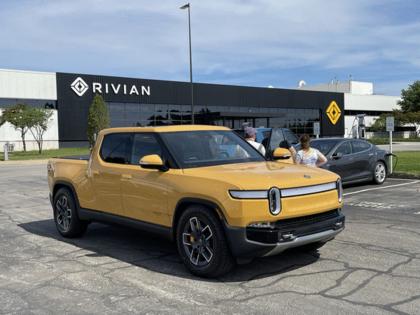Rivian lays off hundreds of employees ahead of the end of EV tax credits
Published in Automotive News
Rivian has laid off about 200 employees as the electric vehicle maker prepares for a U.S. economy with fewer incentives to go green.
The electric truck and sport-utility vehicle manufacturer is preparing for a challenging year in which it plans to launch a more affordable model even as it gets more expensive to buy an EV.
A spokesperson at the company said that the layoffs are equivalent to about 1.5% of its total staff of nearly 15,000. The Wall Street Journal first reported the layoffs.
Rivian is among the many car companies bracing for the changes in federal tax credits.
Under President Trump's Big Beautiful Bill, the $7,500 tax credit, which some buyers receive for purchasingEVs, is set to expire at the end of this month. The credit of up to $4,000 for used EVs also will end.
It's an abrupt reversal of Biden-era efforts to address climate change emissions from gasoline cars.
Transportation is the most significant source of climate-warming emissions in California and the U.S., and experts warn that the sector must become far cleaner to avoid the worst effects of global warming.
In California, approximately one-quarter of new cars sold are either fully electric or plug-in hybrid vehicles, according to the California Energy Commission.
That progress could stall. The planned phaseout of state credits is expected to dampen EV sales, which already have slowed due to waning consumer interest and high tariffs on imported cars.
Anticipating a slowdown in demand as the incentives end, General Motors has laid off 360 workers in Detroit due to the slowed production of the GMC Hummer EV and Cadillac Escalade IQ. Volkswagen plans to temporarily furlough 160 employees and slow production of its electric SUV.
Rivian's newest model, the R2 SUV, is slated to come out next year.
"We have made some recent changes to the Commercial team as part of an ongoing effort to improve operational efficiency for R2," a Rivian spokesperson wrote in a statement to The Times.
It will be one of the company's more affordable options, starting at $45,000. Its current R1S SUV starts at $76,900. At this price level, Rivian will be able to compete with other EV companies such as Tesla, which also has a model starting at about $45,000.
Rivian first made a name for itself with its Earth-toned electric trucks, which debuted in 2018. The company was founded in Florida and moved to Irvine in 2020, where it is based today.
The introduction of its heavy-duty EVs initially appealed to more-affluent consumers, with some of the models sporting sticker prices above $120,000.
After taking the company public in 2021, the retailer has faced a number of challenges. It has had to grapple with supply chain issues, steep price points and order delays.
Like all EV companies, it is now struggling with policy changes out of Washington.
Because Rivian makes only EVs, the company's sales have been derailed with changes in compliance credits. Previously, the company would sell these credits to other car companies that needed to meet fuel economy and emission standards.
In its second quarter, the company reported a loss of $1.1 billion.
Rivian shares have climbed about 5% this year. That's less than half the gain of the tech-heavy Nasdaq composite index for the same period.
©2025 Los Angeles Times. Visit at latimes.com. Distributed by Tribune Content Agency, LLC.








Comments